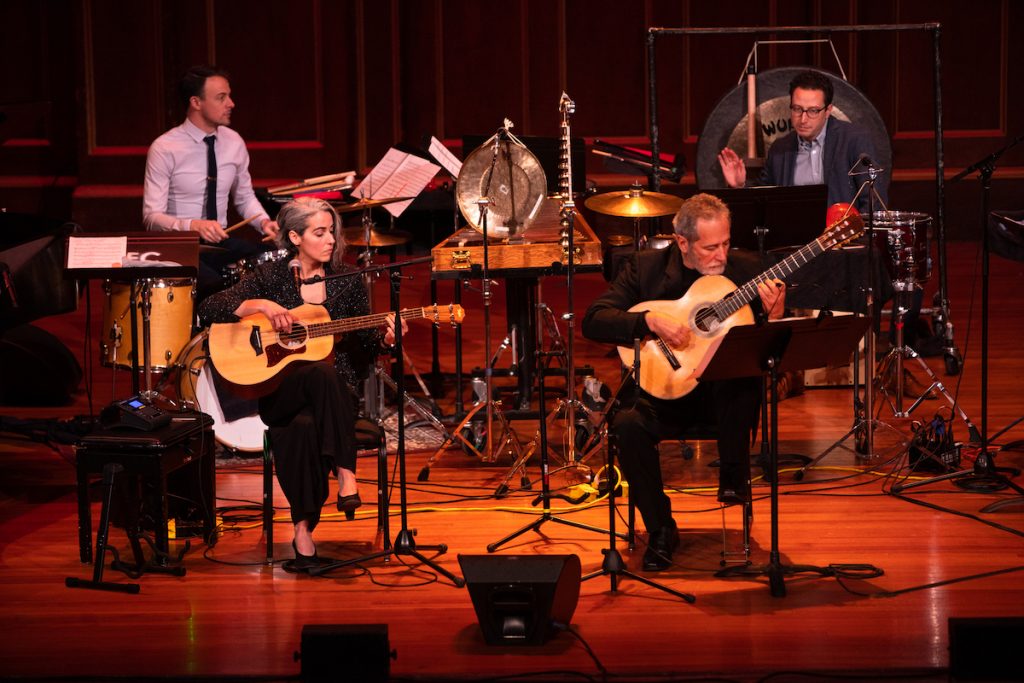Assads, Third Coast Percussion bring “Archetypes” to life

According to Carl Jung, stories, myths, and legends from around the globe revolve around common characters by which individuals can measure their own personalities and identities. That is the focus of “Archetypes,” a new musical program devised by guitarist Sérgio Assad, his daughter the pianist and vocalist Clarice Assad, and the ensemble Third Coast Percussion.
Twelve short, exploratory works spanning the intricacies of classical chamber music and the drive of Latin jazz, the program had its Boston and Celebrity Series premieres on Saturday night at Jordan Hall.
As written by the Assads and the Third Coast quartet, each piece cast a vivid impression of its respective theme. A composition depicting a hero took on a grand sweep, while the zesty rhythms of another piece brought to mind the cavalier persona of the classic rebel. Music contains archetypes of its own, and these works embodied concepts of humanity that exist in all cultures.
Clarice Assad’s “The Rebel” led off the program with a vibrant groove, the music unfolding from a flourish on the drum set. As it progressed, melodies echoed between piano and marimba took on the suave grandeur and zeal of a score to a spy film. Assad’s own wordless vocals brought radiant glow to the line as the percussionists answered with steady rhythms from tom-toms and cajon.
Sérgio Assad’s “The Magician” was cast in mystery. The work’s harmonies, with their modal inflections, became enmeshed in a wash of sparkling colors from cymbals and vibraphone. Central to the short piece, though, were the bebop licks, which took on angular shapes and stinging dissonances as they unfolded.
Feelings of tenderness and isolation were explored in Sérgio Assad’s “The Innocent” and “The Orphan.” These delicate miniatures featured the ensemble in soft melodies, gently flowing arpeggios in guitar and piano, and warm, improvisatory solos, which Assad played with sensitivity.
David Skidmore’s “The Lover” also unfolded from simple gestures—here an arpeggio spanning an octave that flowered into beautiful chromatic turns. The performers unspooled their phrases with increasing intensity, yet they never erupted in fervor—the music more of a controlled passion than urgent, burning desire.
Equally powerful was Peter Martin’s “The Ruler.” Anchored by sweeping phrases from Assad’s guitar, the lines swelled into grand statements, as if the full ensemble were relaying a tale from long ago. Visuals brought additional flair as the percussionists unfurled fans in a fiery display of flamenco rhythm.
Other works cast an eye towards mid-twentieth-century modernism. Robert Dillon’s “The Sage” was a spacious, pointillistic collage, its mix of dissonant harmonies and sparse textures coming across as if Pierre Boulez were writing a jazz ballad.
Clarice Assad’s “The Jester” took on a Cageian absurdity. This short, humorous piece for percussion involved the players performing on a variety of noisemakers, including flexitone, slide whistle and mouth harp, all of which coalesced in a twanging groove. Assad invited the audience to add their own “whoops”, and she led all in a cascade of buzzes, glissandos, shouts, and rattles. When her stick fell to Sérgio Assad, he at first shook his head, then blared out a note on a party horn.
The mood softened in Clarice Assad’s “The Caregiver” and Sean Connors’s “The Creator,” both of which involved gentle melodies that glittered in their simple textures. The latter had moments of delicate beauty as the percussionists supplied sounds from hand chimes and bells.
In contrast, Clarice Assad’s “The Hero” had the driving intensity of a jam session, which showcased the band in twisting melodies, wildly shifting harmonies, and rhythms that surged into powerful conclusion.
Composed by Sérgio Assad, “The Explorer” also took on a vivacious groove as the musicians traded phrases between vibraphone, glockenspiel, guitar, and piano. Here as elsewhere in this unique program, the performers played with verve, revealing the music’s power to convey the traits underlying ancient, eternal ideas.
The Celebrity Series will host Rob Kapilow and the Verona Quartet exploring the first and last string quartets of Beethoven 3 p.m. February 9 at Jordan Hall. celebrityseries.org; 617-482-6661
Posted in Performances